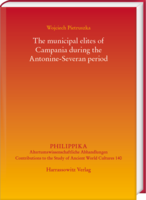|
weitere Titel zum Thema:
Download:
Bitte beachten Sie: Mit digitalen Produkten in Ihrem Warenkorb
wird die Bezahlung nur per PayPal möglich. Der Download dieser Produkte wird bereitgestellt, wenn die Bezahlung bestätigt ist. Although Campania has for centuries attracted the attention of historians, epigraphers and archaeologists, no researcher has yet produced an extensive study concerning the municipal elites of the region during the 2nd and the early 3rd century CE.
In this book Wojciech Pietruszka fills this void by offering a broad insight into the socio-economic aspects of the Campanian municipal elites during the Antonine-Severan period. This in-depth account employs a wide variety of source material, with particular attention on the available epigraphic material. The study focuses on several key issues, which include the general condition of Campania (emphasising the effect that events such as the eruption of Vesuvius in 79 CE and the Antonine plague had on the region), the income and expenditure of the municipal elites (both private financial affairs and public acts of euergetism), the composition of city councils, the role and position of Augustales, and the importance of Campanian equites and senators. Bearing in mind that the whole area of Campania was quite diverse, the author divides Campania into three zones – coastal, central and the foothill regions – which enables him to analyse how the geographical location (the place of living) and its distance from both the ‘centre’ and the important trade routes influenced the way the municipal elites functioned. Finally, by comparing these research results with information from the earlier period, Pietruszka attempts to answer the question of whether the 2nd/beginning of the 3rd century CE was a time of real crisis, continuity, or growing prosperity for the municipal elites and Campanian cities. |
|||||||||||||||||||||||||||||||||||||||






